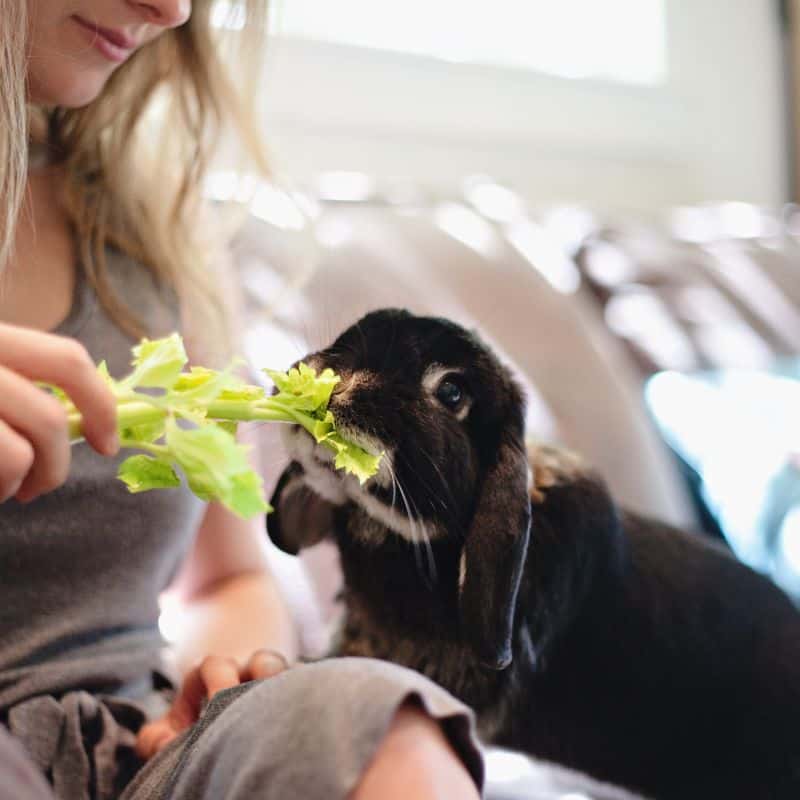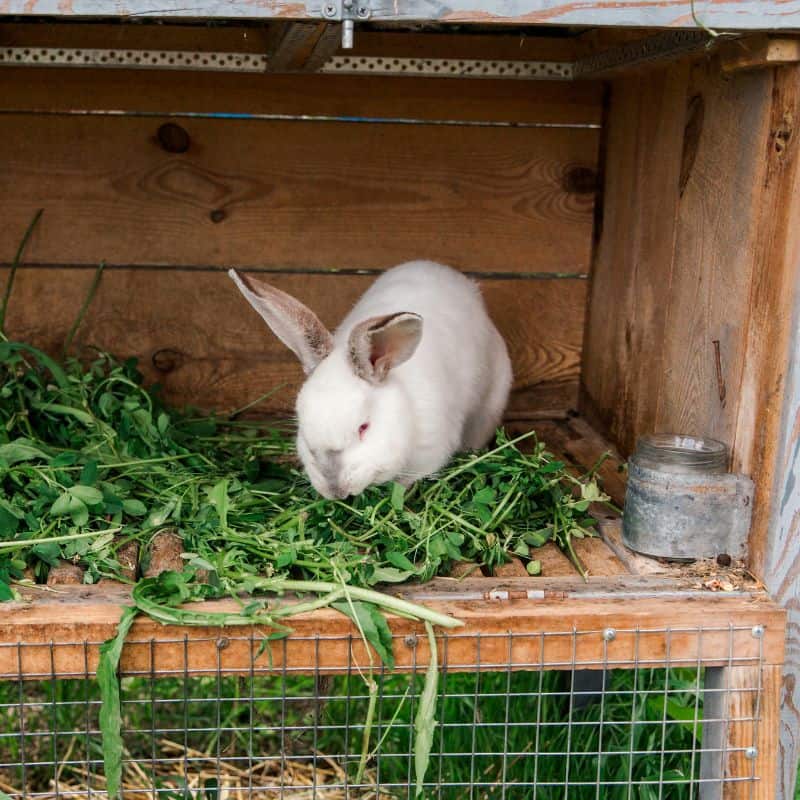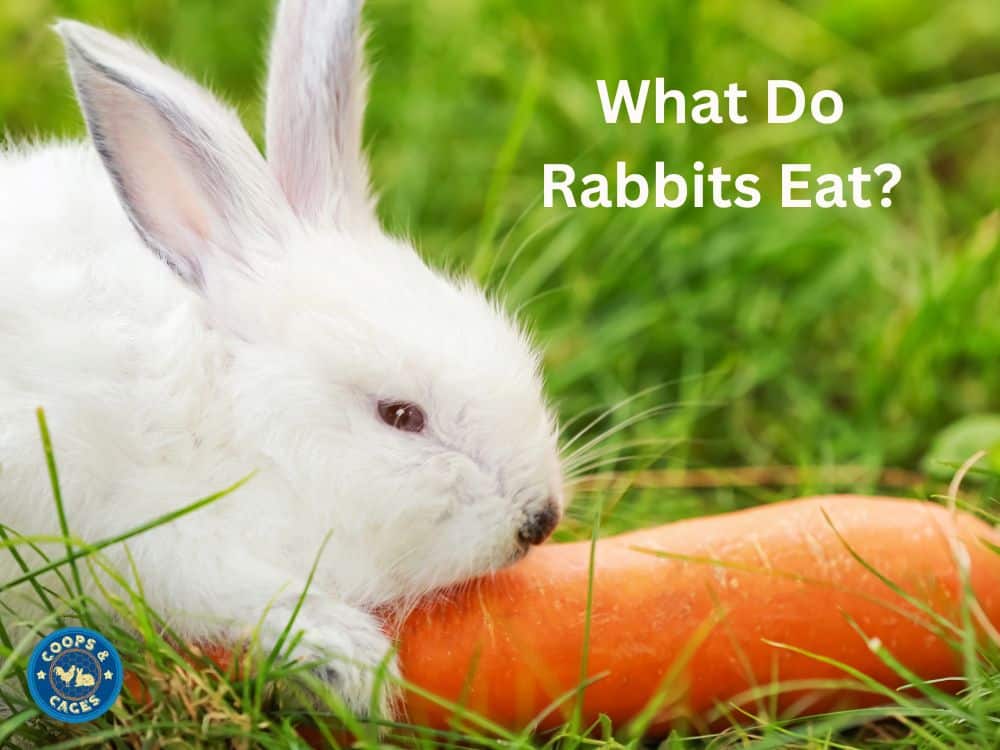Proper nutrition is the most important factor in maintaining your pet rabbits’ health. Rabbits will eat whatever you provide them – it is your responsibility as a pet owner to know what type of food your bunny needs to remain happy and free from illness.
If you feed them the wrong food, it could even kill them! So, what do rabbits eat? Let’s find out together…
Hay and Grass
Hay or grass is by far every rabbit’s favourite food. Fresh hay and grass should form around 80% of your rabbit’s diet.
Hay and grass contain plenty of long strand fibrous material that promotes healthy gut activity. Rabbits will nibble constantly on hay but they will also nest and play in it too.
Grass and hay contain around 20% high fibre, moderate levels of protein (10-15%), as well as other essential minerals. Hay and grass are also low in fat, sugar and starch.
This represents the ideal balanced diet for rabbits. The only restriction is you need to be careful about using alfalfa hay. Alfalfa hay is extremely rich and should only be given as a treat.
A constant unlimited supply of hay is essential for rabbits’ dental health as well as it allows them to chew constantly. If they cannot chew constantly their teeth will grow to an unhealthy length and become painful.
You should choose clean grass hay that is dry and free from mould. Avoid collecting grass from areas such as roadsides that have been sprayed with herbicides.
Pellets
Commercial rabbit pellets are popular. They are a great way to add nutrition to their diet but do not usually provide your rabbits with all their dietary needs.
Some of the muesli-like mixes are particularly lacking in those essential long fibre materials that are easily provided in hay or grass.
Some ‘complete’ pellets provide a good balance of nutrients but they are not a permanent substitute for grass hay. Alfalfa pellets are very rich and may cause some digestive system imbalances so avoid these except as treats.
If you do use pellets or other ‘complete’ foods then ensure that these contain at least 20% long fibres and less than 15% protein. Rabbits should be fed no more than 25g daily of pellets per average-sized rabbit.
Vegetables
The addition of fresh leafy greens and vegetables adds extra nutritional value and variety to your bunny’s diet.
Leafy greens and vegetables should make up about 15% of your rabbits’ daily diet and could include:
- Bok choy
- Brussel sprouts
- Capsicum
- Carrot (including the tops)
- Celery
- Cos lettuce
- Cucumber
- Dandelion greens
- Kale
- Watercress
Provide these vegetables in small quantities per day and provide lots of variety.

Fruit
Fruit should only ever be given as special treats in very small quantities. The high levels of sugars in fruit will play havoc with the gut bacteria, causing digestive problems. And just like humans, high fat and sugar content diets can lead to obesity in rabbits.
Fruits rabbits can eat include:
- Apple (without the seeds)
- Peach (without the pit)
- Pear
- Strawberry
- Watermelon
What Do Rabbits Eat When They Are Babies?
Baby rabbits, known as kits, need a consistent diet. Sudden changes in any rabbit’s diet can cause fatal illnesses because their gut bacteria are not able to respond quickly enough.
Kits are particularly vulnerable and sensitive, especially when they’re facing the stress of entering a new home. Be careful to maintain the diet recommended by their vet or breeder.
As with adult rabbits, baby rabbits should have a constant supply of good grass to feed on every day. Supplement this with some fresh leafy greens and vegetables.
But always introduce new foods gradually; allow 1 – 2 weeks to make any changes in their diet.
What Not to Feed Your Rabbit
Feeding your rabbit the wrong kinds of food and in the wrong quantities will lead to serious health problems including dental and digestive issues.
Foods not to feed your rabbit include those with a high sugar, fat or protein content. You should also avoid highly processed foods as they may not provide the necessary wear for their teeth.
Foods for rabbits to avoid include:
- Avocado
- Chocolate
- Dairy
- Eggs
- Garlic
- Grapes
- Iceberg lettuce
- Meat
- Onion (including leek)
- Potato
- Rhubarb
Also avoid feeing your rabbits grass clippings when you mow the lawn. As soon as you cut grass it starts to ferment and may contain dangerous moulds and bacteria that will upset their digestive system.

Jordan’s Wrap
A domestic rabbit’s diet should be primarily made up of grass and hay. Commercial rabbit pellets and vegetables can be given to supplement their nutritional needs and add variety.
Fruits make great treats but should be given in moderation as they are high in sugar. Avoid feeding your bunny dairy, meat, onion and grass clippings.
When rabbits are babies, their digestive systems are more sensitive and need to be given a more consistent diet.
If you notice any sudden changes in your rabbit’s diet or eating habits, always book an appointment with your local vet to make sure it isn’t a symptom of something more serious.



